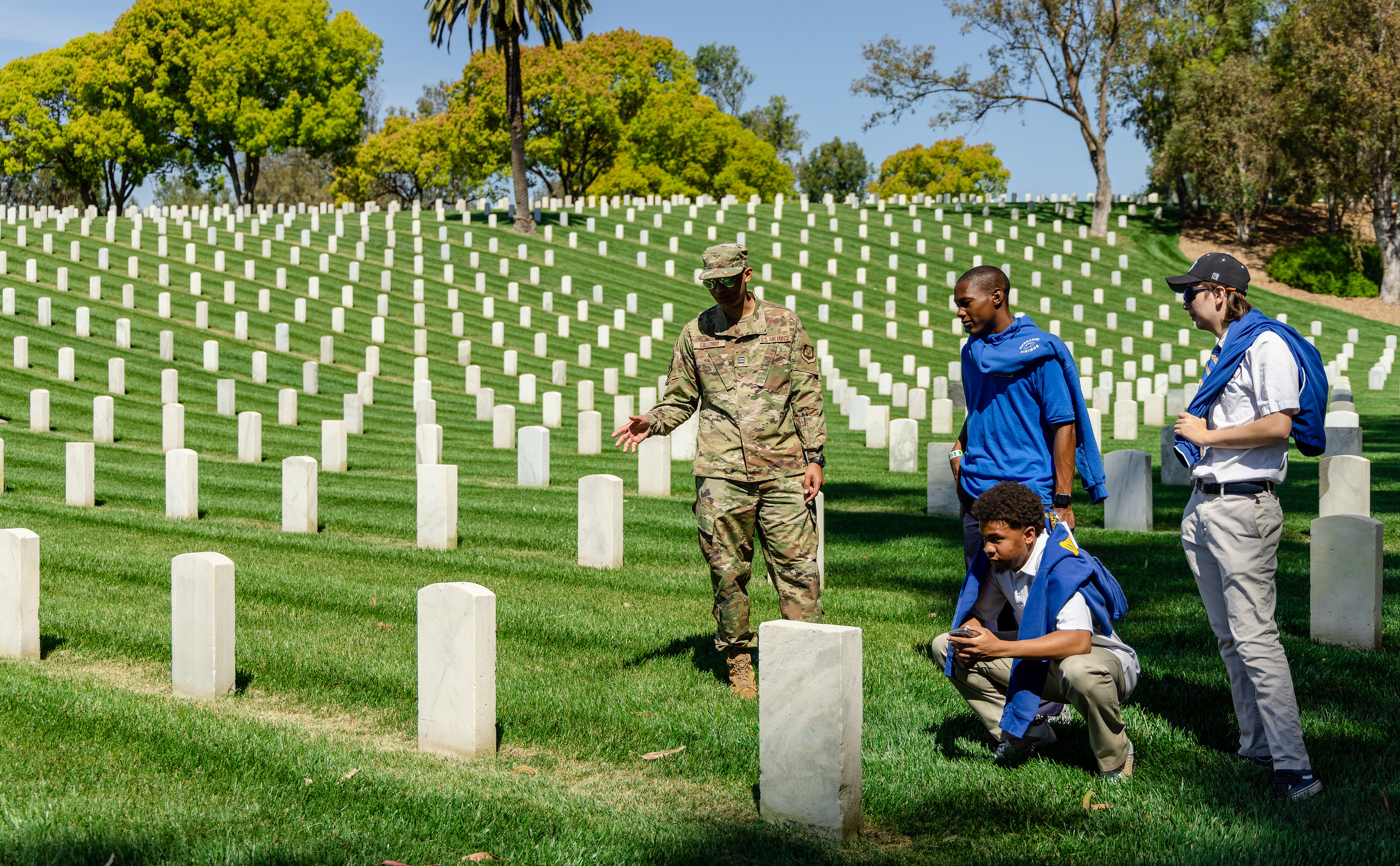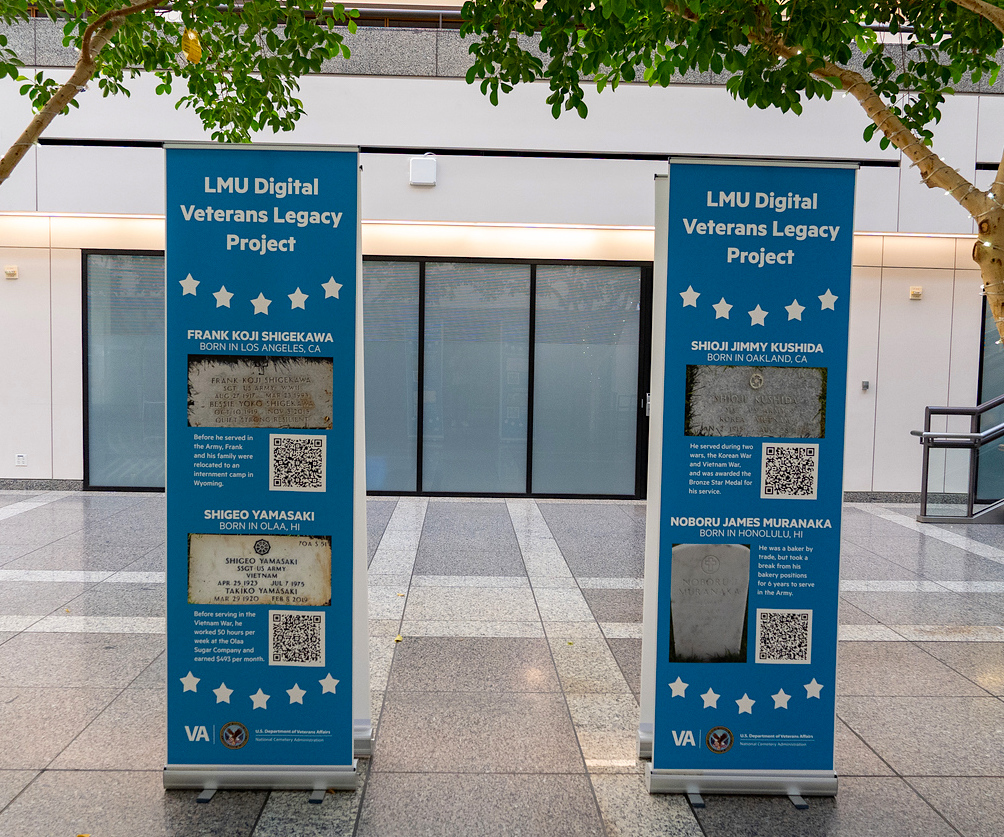
The Los Angeles National Cemetery is a sprawling, 114-acre facility in West Los Angeles. Each day, thousands of cars drive by the cemetery, which is located directly next to the busy San Diego (405) Freeway. But unbeknownst to many of these drivers, the Los Angeles National Cemetery (LANC) is the final resting place of over 300 Buffalo Soldiers, African American soldiers who served on the Western Frontier following the Civil War. A number of Asian American veterans, specifically Japanese American and Chinese American veterans, are also buried at LANC. The oft-forgotten history of these veterans is part of a rich archive that Loyola Marymount University’s Digital Veterans Legacy (LDVL) Project is uncovering.
The LDVL Project aims to uplift the stories of these veterans and to give students the opportunity to investigate the historical contexts that drove people of color to enlist, even during politically tumultuous moments in history. For example, Buffalo Soldiers bravely served the United States during a time where formalized racial segregation ran rampant. For project manager Julianne De La Cerda, the project’s mission is important because it cuts to the core of how American identity has shifted over time.
“When you think about, for example, Japanese American veterans, many chose to leave internment camps to serve their country,” said De La Cerda. “What would make someone want to serve a country that has historically discriminated against them? Researching this expands ideas of what it means to be an American, which is really important because history is different for different groups.”
The project originally received a $500,000 grant from the U.S. Department of Veteran Affairs. The grant was renewed this year, a testament to the important and collaborative work being done at LMU. The interdisciplinary, multimedia project actively engages the community in learning about histories not often studied in the traditional classroom setting. The engaged learning aspect is vital to Deanna Cooke, clinical associate professor of psychology and director of the LDVL Project. Cooke is also the director of the Bellarmine College of Liberal Arts’ Engaged Learning program.
“There is so much at a national level that is attempting to erase history and wash over history,” said Cooke. “I’m very proud to be a part of something that is actually trying to uplift history. The stories of folks fighting in wars have been told, but these individual stories haven’t been told.”
The LDVL project works with LMU’s undergraduate and Air Force Reserve Officer Training Corps (AFROTC) students, along with local K-12 schools and community-based organizations to research the history of the Buffalo Soldiers and Asian American veterans. Students learn how to conduct genealogical research, to think critically about history, and to uplift the stories of these veterans through media projects. Students also take guided field trips to LANC.
“Our core mission is providing education so it makes sense that we work with a cross section of young people, we are getting undergraduates involved in mentorship, and conducting background research so we can provide packets of genealogical research to teachers who want to implement this curriculum in their classes,” said De La Cerda. “This is such a critical point in a [student’s] life and we have the opportunity to continue expanding their knowledge and what they’re exposed to.”
Major Kevin Kim, an LMU AFROTC education and recruiting officer, acknowledges the importance of producing narratives about the military’s often underrepresented and forgotten heroes.
“As an Asian American growing up in Southern California, I cannot recall a time in school when the heroic stories of the Buffalo Soldiers or our Asian American veterans were brought to light,” said Kim. “I firmly believe in confronting our history, both its positive and negative aspects. It is our duty as a nation to present all facts to students so that historical lessons are not forgotten. Our country’s journey has been shaped by its past, and by learning from it, we can prevent tragic events from recurring in the future.”
The project’s commitment to social justice and uplifting underrepresented narratives is a reflection of LMU’s Jesuit and Marymount values.
“The project is very connected to the education of the whole person and looking at things from multiple perspectives. It’s about [people] for others, which is something that we focus on a lot — really thinking about both the fact that we are doing direct work with high schools and K-12 folks, but also reaching out thinking about the veterans themselves,” said Cooke.

Along with engaging students through field trips to LANC and research in the classroom, the project has made concerted efforts to engage the wider public in learning about the histories of veterans of color. The project recently hosted an exhibit at LMU that included pictures of genealogical records uncovered by students. The exhibit asked attendees to reflect on the importance of telling stories about Asian American and African American veterans, and to think about why the individuals chose to serve America. It was important for the project organizers to include an exhibition of student work, so that the wider public could engage with the eye-opening research conducted by project participants.
Bringing together the work of students, teachers, and community organizers from across Los Angeles, the LMU Digital Veterans Legacy Project documents the memory of the lives of the diverse veterans who serve this country and asks the public to contextualize these within the complex history of our nation.



